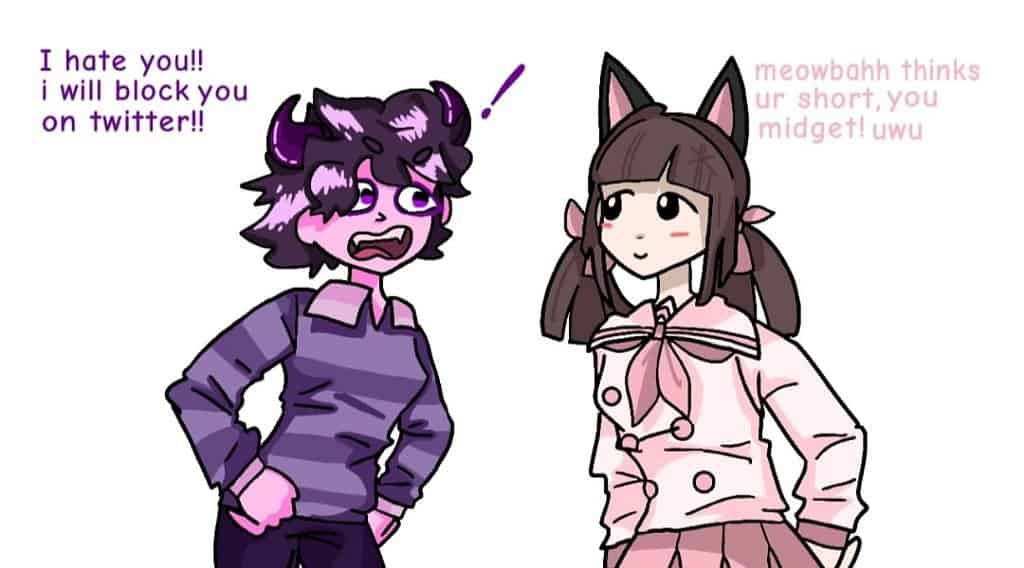Ever wondered what your cat's "meowbahh" really means? If you're a cat owner, you've probably heard this strange yet adorable sound more times than you can count. It's not just a random noise—it's actually your cat's way of communicating with you. Understanding "meowbahh" is like unlocking a secret code that reveals your feline friend's deepest desires and emotions.
Picture this: You're sitting on the couch, scrolling through social media, when suddenly your cat leaps onto your lap and lets out a loud "meowbahh." What does it mean? Is it hungry? Bored? Or maybe it just wants some extra love? The truth is, cats are incredibly expressive creatures, and their vocalizations hold a wealth of information—if only we knew how to interpret them.
But don't worry, you're not alone. Most cat owners find themselves scratching their heads (or their cats' heads) trying to figure out what their furry companions are trying to say. That's why we've put together this comprehensive guide to help you decode the mysterious world of "meowbahh" and strengthen your bond with your beloved pet.
Read also:Is Lilithberry Ai Unpacking The Truth Behind This Tech Sensation
Here's a quick table of contents to help you navigate this article:
- What is Meowbahh?
- The Science Behind Meowbahh
- Types of Meowbahh
- Why Do Cats Meowbahh?
- Decoding Your Cat's Meowbahh
- Common Misconceptions About Meowbahh
- How to Respond to Meowbahh
- Benefits of Understanding Meowbahh
- Tips for Strengthening Your Bond
- Conclusion
What is Meowbahh?
Let's start with the basics. "Meowbahh" is essentially a variation of the classic "meow" sound that cats make. But it's not just any meow—it's often louder, more expressive, and sometimes even a little dramatic. Think of it as your cat's way of saying, "Hey, human! Pay attention to me!"
Cats use "meowbahh" to communicate a wide range of emotions, from hunger and excitement to frustration and loneliness. While adult cats rarely meow at each other, they seem to have developed this unique vocalization specifically for interacting with humans. It's like they've adapted their language to better communicate with us—pretty clever, right?
Is Meowbahh Unique to Certain Breeds?
Interestingly, some cat breeds are more vocal than others. For example, Siamese cats are notorious chatterboxes and are known for their loud, persistent "meowbahh." On the other hand, Persian cats tend to be quieter and may only "meowbahh" when they really need something. So, if you're a Siamese owner, you might be hearing "meowbahh" a lot more often than if you have a Persian.
The Science Behind Meowbahh
Now, let's dive into the science behind "meowbahh." According to experts, cats have an incredible ability to modify their vocalizations based on the situation. They can change the pitch, tone, and volume of their "meowbahh" to convey different messages.
Studies have shown that cats can even mimic the sound of a baby crying when they want food. This is because humans are naturally more responsive to sounds that resemble a crying infant. So, if your cat lets out a particularly high-pitched "meowbahh," chances are it's trying to manipulate you into giving it a treat. Sneaky, right?
Read also:Rita Faez Onlyfans Rising Star In The Digital Age
How Cats Learn to Meowbahh
Cats aren't born knowing how to "meowbahh." Like humans, they learn by observing and experimenting. Kittens start meowing to get their mother's attention when they're hungry or cold. As they grow older, they refine their meows and develop unique sounds like "meowbahh" to communicate with humans.
Types of Meowbahh
Not all "meowbahh" sounds are created equal. Cats have a wide range of vocalizations, each with its own meaning. Here are some of the most common types of "meowbahh" you might hear from your feline friend:
- Short Meowbahh: This is usually a friendly greeting. Your cat might say "meowbahh" when you come home or when you enter the room.
- Long Meowbahh: A prolonged "meowbahh" often indicates urgency. Your cat might be telling you it's hungry, thirsty, or wants to go outside.
- Soft Meowbahh: This gentle sound is often a sign of affection. Your cat might "meowbahh" softly while curling up next to you on the couch.
- Loud Meowbahh: A loud, persistent "meowbahh" could mean your cat is in distress. It might be feeling anxious, lonely, or even in pain.
Why Do Cats Meowbahh?
Cats "meowbahh" for a variety of reasons. Sometimes it's because they want something, like food or attention. Other times, it's a way of expressing their emotions, whether it's happiness, frustration, or anxiety. Understanding why your cat "meowbahh" is key to building a stronger relationship with your pet.
Here are some common reasons why cats "meowbahh":
- They're hungry or thirsty
- They want to play
- They're feeling lonely
- They're stressed or anxious
- They're in pain
How to Tell if Your Cat is in Pain
If your cat suddenly starts "meowbahh"ing more than usual, it could be a sign that something is wrong. Look for other symptoms, such as lethargy, loss of appetite, or changes in behavior. If you suspect your cat is in pain, it's important to take it to the vet for a check-up.
Decoding Your Cat's Meowbahh
Decoding your cat's "meowbahh" can be a fun and rewarding challenge. By paying attention to the tone, pitch, and context of the sound, you can start to understand what your cat is trying to tell you.
For example, if your cat lets out a soft "meowbahh" while rubbing against your leg, it might be saying, "Hey, I love you!" On the other hand, if it gives you a loud, insistent "meowbahh" in the middle of the night, it might be saying, "Feed me now!"
Using Context Clues
Context is key when it comes to decoding "meowbahh." Consider where your cat is, what it's doing, and what time of day it is. For instance, if your cat "meowbahh"s near its food bowl at dinnertime, it's probably asking for food. But if it "meowbahh"s while staring out the window, it might be reacting to something it sees outside.
Common Misconceptions About Meowbahh
There are a few common misconceptions about "meowbahh" that we need to clear up. For starters, not all cats "meowbahh" the same way. Some cats are naturally more vocal than others, and that's perfectly normal. Additionally, "meowbahh" isn't always a sign of distress. Sometimes, cats just like to chat!
Another misconception is that cats only "meowbahh" when they're hungry. While food is certainly a common reason for "meowbahh," it's not the only one. Cats might "meowbahh" because they're bored, lonely, or just want to say hello.
Why Cats Don't Meow at Each Other
Interestingly, adult cats rarely meow at each other. Instead, they rely on body language, scent marking, and other non-verbal cues to communicate. This is because meowing is primarily a behavior they've developed to interact with humans. So, if you ever catch your cat "meowbahh"ing at you, consider it a compliment—it means your cat trusts you enough to communicate openly!
How to Respond to Meowbahh
Now that you know what "meowbahh" means, how should you respond? The answer depends on the context and your cat's needs. If your cat is hungry, it's probably a good idea to give it some food. If it's bored, you might want to spend some time playing with it. And if it's just saying hello, a simple pat on the head will do.
It's important to respond to your cat's "meowbahh" in a way that acknowledges its needs without encouraging bad behavior. For example, if your cat "meowbahh"s for attention, giving it a treat might reinforce the behavior. Instead, try engaging it with a toy or a gentle stroke.
Training Your Cat to Meowbahh Less
If your cat's "meowbahh" is starting to get out of hand, there are a few things you can do to tone it down. First, make sure your cat's basic needs are being met. Is it getting enough food, water, and attention? If not, addressing these issues might reduce the frequency of "meowbahh." Additionally, you can try training your cat to associate silence with positive reinforcement, such as treats or playtime.
Benefits of Understanding Meowbahh
Understanding your cat's "meowbahh" has numerous benefits. For one, it strengthens the bond between you and your pet. When you respond to your cat's needs, it learns to trust you more and becomes more affectionate. Additionally, understanding "meowbahh" can help you identify potential health issues before they become serious.
By paying attention to your cat's vocalizations, you're showing it that you care and are willing to listen. This can lead to a more harmonious relationship and a happier, healthier cat.
Tips for Strengthening Your Bond
Here are a few tips for strengthening your bond with your cat:
- Spend quality time playing with your cat
- Give it plenty of attention and affection
- Provide it with a comfortable and safe environment
- Respond to its "meowbahh" in a positive and consistent way
- Learn to recognize its unique personality and preferences
Remember, every cat is different, so what works for one cat might not work for another. The key is to be patient, observant, and willing to adapt to your cat's needs.
Conclusion
In conclusion, "meowbahh" is much more than just a random noise—it's a vital part of your cat's communication with you. By understanding and responding to your cat's "meowbahh," you can build a stronger, more meaningful relationship with your furry friend.
So, the next time your cat lets out a loud "meowbahh," don't just ignore it—take a moment to figure out what it's trying to tell you. You might be surprised by how much you can learn about your cat's thoughts and feelings just by listening.
And don't forget to share this article with your fellow cat lovers! The more people understand "meowbahh," the better for our feline friends. Who knows? You might even inspire someone to adopt a cat of their own and experience the joy of "meowbahh" firsthand.



